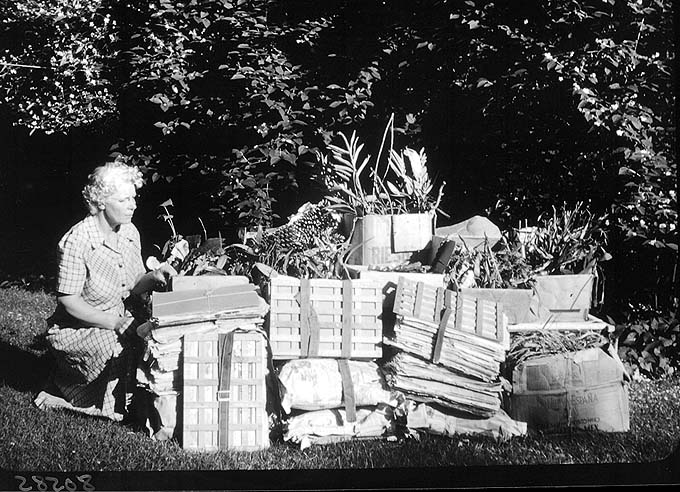Delia "Mickie" Akeley (1875-1970)
Field Museum taxidermist Carl Akeley. (Carl Akeley pioneered the techniques used to create the Museum's famous animal dioramas.) Delia's accomplishments include discovering a new species of antelope and bird, crossing the then unexplored desert country between Kenya's Tana River and Ethiopia by camel caravan, exploring the Tana River from the Indian Ocean in a dugout canoe, and living for many months with the pygmies in the Ituri Forest in northeastern Zaire. Delia, an expert markswoman, also is renowned for felling the larger of the two African elephants on display in The Field Museum's Stanley Field Hall.
After spending eight grueling months in East Africa in 1906 collecting animals for an upcoming Field Museum exhibit, Delia and Carl Akeley decided to travel to Kenya to hunt elephants. Within two weeks of arriving, Carl shot a large elephant, narrowly escaping death in the process when a buffalo and a stampeding herd of elephants charged him. Though the elephant was missing a tusk, the couple reluctantly kept the specimen and shipped it back to the Museum.
A few weeks later, while in the foothills of Mt. Kenya, they spotted another large exhibit-quality elephant. This time, Delia took charge.
"Scarcely breathing, and with legs trembling so I could hardly stand, I waited for the elephant to move forward," she wrote in her book "All True!" "Dimly through the mist the dark shape came slowly from behind the bush, exposing a splendid pair of tusks and a great flapping ear which was my target. With nerves keyed to the point of action I fired, and the first elephant I shot at fell lifeless among the dew-wet ferns . . . He was a splendid elephant, standing ten feet ten inches tall at the shoulders and carrying 180 pounds of ivory. In his back was a great festering wound caused by a poisonous spear. The iron blade had worked its way into his flesh to his rib and he must have suffered agonies."
In 1909 the two elephants went on display in The Field Museum's former home in Jackson Park. Today, they can be found in the middle of Stanley Field Hall (Delia's elephant is the one with two tusks).
Before she died in 1970 at the age of 95 in Daytona, Fla., Delia published several books about her African adventures, including "Jungle Portraits" and "All True!," as well as a book about her pet monkey and constant companion, J.T. Jr.
Margery Claire Carlson (1892-1985)

Margery Carlseon was a pioneer in science and conservation. She was the first woman to major in botany at Northwestern University, and she was the first woman to become a full professor at Northwestern where she taught for more than 30 years. Dr. Carlson was also a Research Associate at The Field Museum, where many of the specimens she collected are housed.
The collecting expeditions Margery made along with research associate and long-time companion Kate Staley are her most notable adventures. The pair traveled in Mexico, El Salvador, Honduras, Costa Rica, Hawaii, Europe, and the United States in search of rare plant species to collect and study. The two women traversed jungles in a jeep and on foot, relying on whatever supplies they could carry and the knowledge of indigenous guides.
Describing one of their journeys, Margery wrote "Every collector hopes that he will be able to bring home some species unknown to science, never before described or even given a botanical name." Certainly Margery met her own expectations. One trip through Central America in 1948 yielded about 4,000 plant specimens and the discovery of 15 new plant species.
Margery is also remembered for her devotion to conservation. She was one of the founders of the Illinois Chapter of the Nature Conservancy and the national Conservancy. Raising money, negotiating with landowners, and planting seeds were some of the ways Margery contributed to the preservation of natural areas in Illinois, as well as Indiana and Wisconsin. The Margery C. Carlson Nature Preserve was named in 1976. The 400-acre state preserve is located on the Vermilion River in LaSalle County, Margery's birthplace and one of the areas she helped acquire. Dr. Margery C. Carlson died in 1985 at the age of 92.